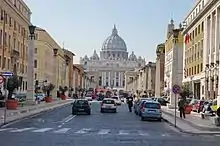Piet Kasteel
Petrus Albertus "Piet" Kasteel (4 November 1901 – 13 December 2003) was a Dutch journalist, diplomat, and colonial administrator. He was parliamentary editor of De Maasbode, and fled to England during World War II where he served for the Dutch government-in-exile. He served as Governor of Curaçao and Dependencies from 15 July 1942 until 4 August 1948, Dutch Ambassador to Chile (1948–1956), to Ireland (1956–1966) and briefly to Israel (1966).
Piet Kasteel | |
|---|---|
.jpg.webp) Kasteel (1942) | |
| Ambassadors of the Netherlands to Ireland | |
| In office March 1956 – 1966 | |
| Ambassadors of the Netherlands to Chile | |
| In office 1948–1956 | |
| Governor of Curaçao and Dependencies | |
| In office 15 July 1942 – 4 August 1948 | |
| Preceded by | Gielliam Wouters |
| Succeeded by | Leonard Antoon Peters |
| Personal details | |
| Born | Petrus Albertus Kasteel 4 November 1901 Zwolle, Netherlands |
| Died | 13 December 2003 (aged 102) Rome, Italy |
| Occupation | journalist, diplomat and colonial administrator |
Biography
Kasteel was born on 4 November 1901 in Zwolle, Netherlands.[1] He converted to the Catholic Church.[2] In 1923, he moved to Amsterdam, where he became a journalist for De Tijd,[3] and founded the Catholic association De Klare Waarheid.[4] In October 1929, he became parliamentary editor of De Maasbode,[5] then the largest Catholic newspaper in the Netherlands.[6] In 1938, he received his doctorate in political and social sciences from KU Leuven on a biography of prime minister Abraham Kuyper.[3][7]
On 14 May 1940, after the German invasion of the Netherlands, Kasteel as a known anti-fascist boarded a fishing boat leaving his wife and children behind, and arrived in England two days later. He offered his services to the Dutch government-in-exile under the nom de guerre "Chateau neuf du Pape".[1] He started to work for the Ministry of Justice, and befriended Pieter Sjoerds Gerbrandy. In September 1940, Gerbandy became Prime Minister-in-exile, and appointed Kasteel as his personal secretary.[3]
On 15 July 1942, Kasteel was installed as Governor of Curaçao and Dependencies.[8] In 1947 negotiations started for political autonomy of Curaçao and Dependencies. The island of Aruba no longer wanted remain subordinate to Curaçao, and demonstrations were organised.[9] In January 1948, the delegations of Aruba and Curaçao demanded the resignation of Kasteel.[10] In June 1948, Kasteel announced his resignation,[11] and left on 4 August 1948.[8]

Kasteel was appointed Ambassador of the Netherlands to Chile, and served until 1956,[3] In March 1956, he was appointed Ambassador to Ireland, and served until 1966. He served briefly as Ambassador to Israel, and retired in December 1966.[1] After retiring, Kasteel moved to Via della Conciliazione in Rome, Italy near the Vatican where his son Karel served in the Apostolic Camera.[3]
On 13 December 2003, Kasteel died in Rome, at the age of 102.[3]
Honours
 Netherlands Knight of the Order of the Netherlands Lion.[12]
Netherlands Knight of the Order of the Netherlands Lion.[12] France Commander in the Legion of Honour.[13]
France Commander in the Legion of Honour.[13] Brazil Order of the Southern Cross.[14]
Brazil Order of the Southern Cross.[14] United States Medal of Freedom with Silver Palm.[15]
United States Medal of Freedom with Silver Palm.[15].svg.png.webp) Vatican Knight in the Order of the Holy Sepulchre.[16]
Vatican Knight in the Order of the Holy Sepulchre.[16]
References
- "Dr. P.A. (Piet) Kasteel". Dutch Parliament (in Dutch). Archived from the original on 2022-02-13. Retrieved 12 February 2022.
- "Piet Kasteel, Gouverneur van Curaçao". Amigoe di Curacao (in Dutch). 18 May 1942. Retrieved 12 February 2022.
- Jan Kuijk en Pieter van der Ven (17 December 2003). "Leven met Kuyper, Gerbrandy en zoon Karel". Trouw (in Dutch). Archived from the original on 2021-02-25. Retrieved 12 February 2022.
- "Piet Kasteel". Dagblad van Noord-Brabant (in Dutch). 23 November 1927. Retrieved 12 February 2022.
- "De Parlementaire Redacteur van de "Maasbode"". de Volkskrant (in Dutch). 7 October 1929. Retrieved 12 February 2022.
- "Witlox, Johannes Henricus Josephus Maria". Huygens Institute for the History of the Netherlands (in Dutch). Archived from the original on 2022-02-13. Retrieved 12 February 2022.
- Piet Kasteel (1938). Abraham Kuyper (Thesis) (in Dutch). Kampen: Kok.
- "Staatkundige geschiedenis periode 1". National Archive of Curaçao (in Dutch). Archived from the original on 2022-02-13. Retrieved 12 February 2022.
- "Demonstratie in Willemstad". De Nederlander (in Dutch). 11 September 1947. Retrieved 12 February 2022.
- "Curaçao krijgt zijn zin". De Gooi- en Eemlander (in Dutch). 30 January 1948. Retrieved 12 February 2022.
- "Staten van Curaçao protesteren". Overijsselsch dagblad (in Dutch). 15 June 1948. Retrieved 12 February 2022.
- "Decoration (in the year 1815-1993)". Open Archives. Archived from the original on 2022-02-13. Retrieved 12 February 2022.
- "Legioen der Eer voor Dr. Piet Kasteel". Limburgsch dagblad (in Dutch). 17 April 1948. Retrieved 12 February 2022.
- "Kort Nieuws". Twentsch dagblad Tubantia en Enschedesche courant (in Dutch). 28 February 1948. Retrieved 12 February 2022.
- "Vrijheidspalmen voor Kasteel". De Tijd : godsdienstig-staatkundig dagblad (in Dutch). 30 October 1946. Retrieved 12 February 2022.
- "Ridders en edelvrouwen Heilig Graf ingekleed". De tijd : dagblad voor Nederland (in Dutch). 27 May 1968. Retrieved 12 February 2022.